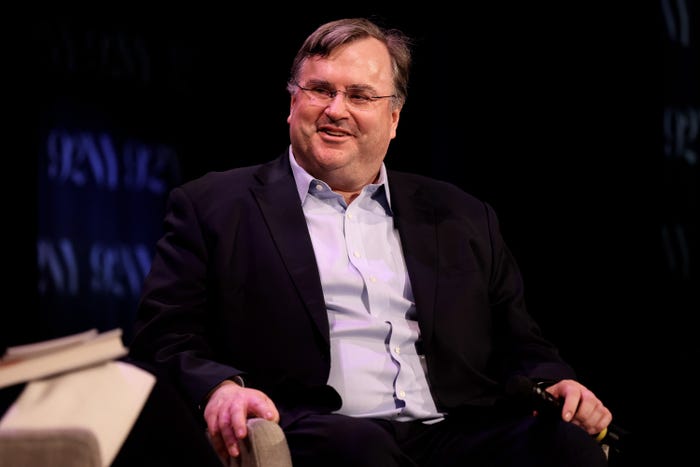Business
Reid Hoffman Identifies AI Opportunities Beyond Software in Biology

Reid Hoffman, co-founder of LinkedIn, has highlighted a significant gap in Silicon Valley’s focus on software that could lead to groundbreaking advancements in artificial intelligence (AI). Speaking on the a16z podcast released on March 11, 2024, he emphasized that the tech industry’s prevailing belief that “everything should be done in software” may hinder innovation in other fields, particularly biology.
Hoffman pointed out that the next wave of transformative AI developments may originate from sectors that investors often overlook due to perceived complexities and regulatory challenges. “What are the areas where the AI revolution will be magical?” he asked. This question reflects his ongoing commitment to exploring intersections between different domains, particularly between “the worlds of atoms and the worlds of bits.”
He argued that AI’s role in biology does not necessarily mean creating drugs independently, but rather assisting scientists in identifying the most promising experiments. Hoffman noted that achieving predictive accuracy does not require perfection; even a 1% success rate could lead to significant advancements. “It’s not a needle in a haystack. It’s like a needle in a solar system,” he stated, suggesting that the potential for breakthroughs is vast.
Hoffman’s insights resonate with broader trends in the healthcare sector, where AI is increasingly recognized for its transformative potential. Cathie Wood, CEO of Ark Invest, echoed this sentiment at the All-In Summit 2025 in September, asserting that the “real AI revolution” is taking place in hospitals and laboratories. She highlighted the synergy between AI technologies and advancements in gene sequencing and CRISPR, a method used for selective DNA modification. Wood described this confluence as a “sleeper” opportunity within a market that remains inefficiently priced.
Major technology companies are already positioning themselves in this rapidly evolving field. Microsoft has been integrating AI into its cloud solutions to enhance hospital operations. Earlier this year, it reported that its medical AI system achieved diagnostic accuracy surpassing that of human doctors in several cases. In the same vein, Nvidia is also expanding its footprint in healthcare. Kimberly Powell, Nvidia’s Vice President of Healthcare, revealed earlier this year that the company is focusing on medical imaging as a primary entry point into the sector. Nvidia has formed multiple partnerships in this sphere, including a recent collaboration with GE Healthcare.
As the intersection of AI and biology continues to gain traction, Hoffman’s observations underscore a pivotal moment for investors and innovators alike. The potential for AI to revolutionize healthcare and related fields presents fertile ground for startups and established companies to explore new avenues of innovation. With the right focus and investment, the next generation of iconic AI companies could emerge from areas previously considered too challenging or traditional for tech-driven solutions.
-

 Lifestyle3 months ago
Lifestyle3 months agoLibraries Challenge Rising E-Book Costs Amid Growing Demand
-

 Sports3 months ago
Sports3 months agoTyreek Hill Responds to Tua Tagovailoa’s Comments on Team Dynamics
-

 Sports3 months ago
Sports3 months agoLiverpool Secures Agreement to Sign Young Striker Will Wright
-

 Lifestyle3 months ago
Lifestyle3 months agoSave Your Split Tomatoes: Expert Tips for Gardeners
-

 Lifestyle3 months ago
Lifestyle3 months agoPrincess Beatrice’s Daughter Athena Joins Siblings at London Parade
-

 World3 months ago
World3 months agoWinter Storms Lash New South Wales with Snow, Flood Risks
-

 Science3 months ago
Science3 months agoTrump Administration Moves to Repeal Key Climate Regulation
-

 Business3 months ago
Business3 months agoSoFi Technologies Shares Slip 2% Following Insider Stock Sale
-

 Science2 months ago
Science2 months agoSan Francisco Hosts Unique Contest to Identify “Performative Males”
-

 Science3 months ago
Science3 months agoNew Tool Reveals Link Between Horse Coat Condition and Parasites
-

 Sports3 months ago
Sports3 months agoElon Musk Sculpture Travels From Utah to Yosemite National Park
-

 Science3 months ago
Science3 months agoNew Study Confirms Humans Transported Stonehenge Bluestones









